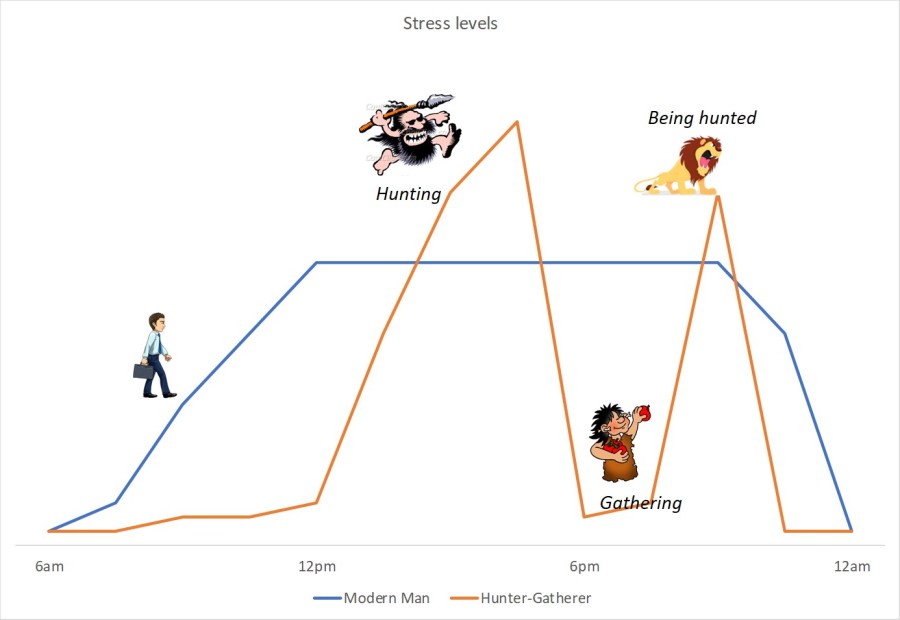
Everyone seems constantly stressed out. Stress triggers are omnipresent and each spark can trigger a cascade – a bad boss, traffic jams, the weather, kids, parents, studies, work….basically everything that makes up routine modern life as we know it.
There is nothing modern about stress though, which is as old as humanity itself. Fact is, we have not changed much physiologically in the past 50 odd thousand years. Most of this time is represented by life as hunter gatherers, a small fraction as agriculturists, and a minuscule portion as post-Industrial Revolution workers that we see ourselves as today. All of the physiological responses to stress – like change in heart rate, blood pressure, etc. – are tied to our fight or flight response. Hence, we retain the same response mechanism that was designed for our two primary purposes: survival and reproduction.
In most cases, modern life does not have predators or pose threats of starvation. Yet, our age old instincts get triggered each time a challenge, an unpleasant experience, or a perceived threat appears. One would think that if our bodies have evolved to respond to these triggers then the response shouldn’t be something to worry about, right? Not exactly if the triggers are as constant as we find them. 12 hour work days with demanding (demonic!) bosses and competitive co-workers, capped by battling peak hour traffic to get home to uncompleted chores, demanding family members, and unbalanced finances, doesn’t sound like the typical hunter-gatherer’s day. So the point is the constancy of the triggers and what it does to us. If every day and every moment is an emergency, what kind of havoc is being wrecked on our body?

Also, we tend to focus on the physiological effects of stress. What gets overlooked is how constancy of stress, and the instinctive, intuition based, short-term thinking it encourages, changes our response mechanism – we end up using this reactive mindset even in situations where careful, systematic, and deeper thinking is required like in relationships, investing, and career choices.
While there are many theories about stress triggers, I do believe that lack of control is a common link, and this is what got me thinking about the (definitively proven!) stress-busting abilities of dogs.

How do dogs reduce stress? Companionship, the fuzzy feeling when we rub their coats, the exercise we get thanks to them, the feeling of being a caregiver, the 10,000 year old domestication history everyone talks about that makes it natural….all fair points. But could a sense of control be one of the strongest factors? Look at it this way: we feel a sense of control in having a well-trained and well-adjusted dog. From the dog’s perspective, (s)he is well-adjusted because you have been accepted as not just an owner, but a guide and leader, or the so-called ‘Alpha’. In a life that throws uncontrollable challenges at us constantly, here is a relationship where you finally feel in control. It is not the leash, the chain, the cage, or the prod that is in control, but you.
In some sense, despite being the Alpha, it is an honest, 2-way relationship where you need your dog as much as (s)he needs you, perhaps more than you know. Your time, patience, love, attention, and devotion will be paid back at rates of return any fund manager would envy.


One thought on “On Stress, Control, and the role Dogs play”